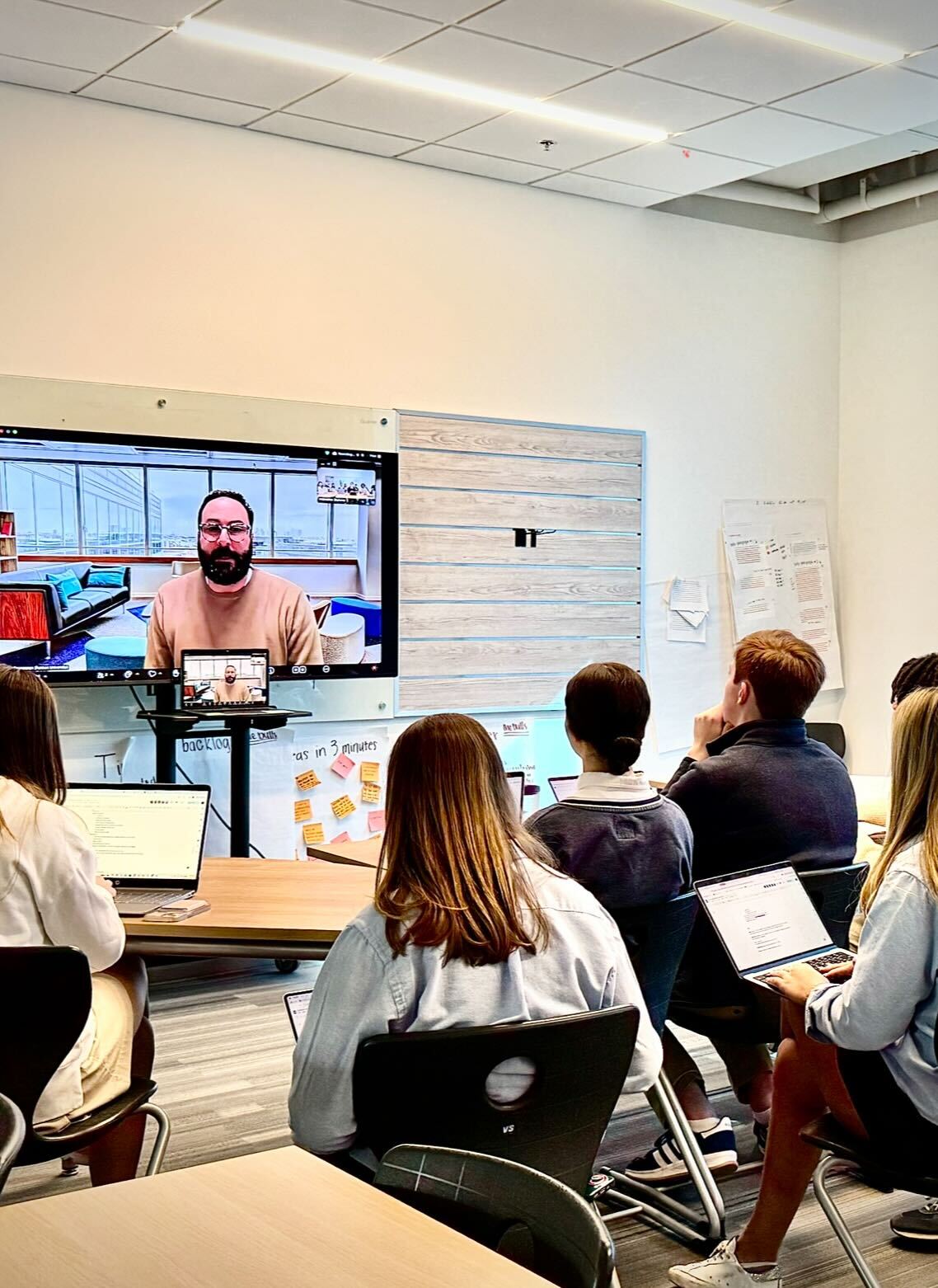In a powerful alignment of purpose and possibility, Mount Vernon’s Innovation Diploma (iD) program has formed a strategic new partnership with Furman University’s Hill Institute for Innovation and Entrepreneurship. This collaboration marks a milestone for both institutions—each committed to developing entrepreneurial thinkers who thrive in uncertainty, lead with empathy, and design for real-world impact.
The Hill Institute, long recognized for its nationally award-winning programs in entrepreneurship and innovation at the college level, recently set out to expand its reach to high school students for the first time. But rather than starting with a rigid program outline, the team followed a design thinking approach, beginning by listening to prospective users. That journey led Executive Director Bryan Davis, Senior Director Eric Cooperman and The Hill Institute team to Mount Vernon, where they hoped to better understand what high school students might need and want from such an experience.
When Eric reached out, Krista Fancher, Director of Innovation Diploma, seized the opportunity—not just to connect, but to co-create. She invited Eric to meet with students, not for a one-off feedback session, but to engage in a full design brief experience. Under her leadership, Mount Vernon students were handed a real-world design brief: to imagine and architect Furman’s first-ever summer entrepreneurship experience for high schoolers. The result has been a dynamic collaboration where students became trusted partners, not just participants.
“So when we went to Mount Vernon, this situation was presented to us. You never know what’s going to happen when you go through the design process,” Davis said. “And this is one of those pivots—more than that, an opportunity—where we see the potential for a much bigger and longer relationship.”
After visiting several schools, The Hill Institute team quickly realized Mount Vernon offered something unique: students who could communicate like entrepreneurs, think like designers, and act with purpose.
“I’ll tell you—we interact with freshmen all the time,” said Cooperman. “We try to recruit freshmen into innovation and entrepreneurship the second they walk on campus. And I can tell you that these 10th graders are the best we’ve ever seen across any high school.”
Expanding Access: A First for Grade 10 in iD
This partnership also marks a significant first for Mount Vernon. It’s the first time that iD has assigned an external design brief to Grade 10 students, a level typically reserved for juniors and seniors. This bold move reflects the trust and confidence Mount Vernon has in its learners and the unique opportunity this design challenge presented.
Over the course of nine weeks, six student teams of sophomores are working collaboratively with The Hill Institute to design Furman’s first-ever summer entrepreneurship experience for high schoolers. From developing the camp structure and crafting learning journeys to designing logos, planning marketing strategies, and envisioning physical swag kits, students are touching every component of the future experience.
“It’s almost too perfect,” said Cooperman. “It seems like all of these things serendipitously came together. But it just feels like the perfect design.”
Building a Flywheel of Innovation
The partnership between Mount Vernon and Furman goes beyond a single semester—it’s designed to become a living, breathing innovation cycle.
“We see a much bigger and longer relationship through almost setting up a flywheel effect,” Cooperman explained. “Students create a program for themselves, live that program, and then the following year they can return to reflect and refine it. What worked? What didn’t? All of a sudden, they’re not just designing—they’re managing something that feels like their own.”
This living feedback loop—where students experience, analyze, and improve their own work—is design thinking at its most powerful. According to iD Director Krista Fancher, “This project hits every aspect of a true design brief: stakeholder collaboration, research, storytelling, brand strategy, logistics, and systems thinking. It’s the perfect storm of purpose and possibility.”
The Real Impact: Student Agency and Authentic Growth
Beyond the deliverables and stakeholder meetings, the greatest growth is happening in the quiet moments. During one team’s daily stand-up, student Oliver Membrillo asked, “Do we want to make a phone stack?”—a subtle prompt for focused, distraction-free collaboration. Without hesitation, every student placed their phone in the middle of the table.
“That’s the kind of moment you can’t script,” Fancher said. “They’re learning to take ownership, not because we told them to, but because they want to do this well.”
Even on their iLearning Day, when school was out of session, students chose to meet virtually with Eric Cooperman to continue the work. “They’re learning to be brave,” Fancher shared. “They make the call, lead the meeting, present their ideas—even when it’s hard. And they’re doing it together.”
A Long-Term Vision
As the pilot unfolds, the momentum is clear: Mount Vernon and The Hill Institute are laying the groundwork for a long-term, student-centered innovation model. One where young people don’t just participate in programs—they design them, live them, and reimagine them year after year.
“Students get instant feedback from themselves—because they’re living the project they built,” said Cooperman. “That’s where transformation happens.”
Both institutions are committed to empowering students to be designers of their own futures. And with this partnership, they’re creating a blueprint for what real-world, purpose-driven education can look like.
“The sky’s the limit,” Davis added. “This is just the beginning.”




